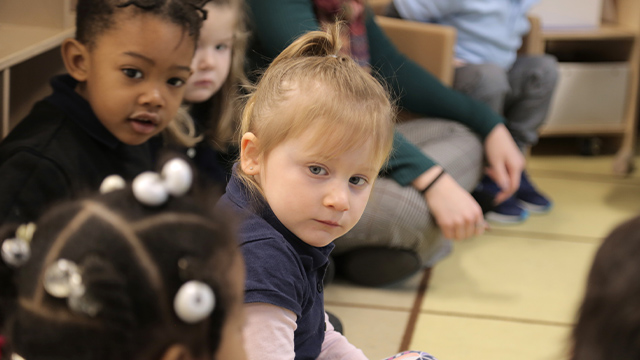Children and families do better when they live in strong and supportive communities, with access to good schools, economic opportunities, and supports such as after-school programs and farmers’ markets. Our youngest children also need high quality early education programs to improve outcomes and prepare them for later success. Mathematica studies the effectiveness of foundation, federal, state, and local investments in programs to improve quality of life in neighborhoods and create lasting change for communities. Examples of how we’ve uncovered evidence to inform key decisions, build partnerships, and create innovative solutions that advance social change include the following.
Preparing children from cradle to career
Through in-depth community case studies, our research on Promise Neighborhoods supported progress for programs in Berea, Kentucky; Buffalo, New York; Minneapolis, Minnesota; Chula Vista, California; and Los Angeles, California. These areas are in the midst of a long-term endeavor to improve students’ educational outcomes and help them reach their full potential. The initiative uses a mix of neighborhood-based services—including educational, family, and community programs—to improve general well-being. We also developed design options to rigorously evaluate the impact of Promise Neighborhoods, including how to coordinate the study with grantees and identify impacts of the most policy-relevant aspects of the program.
Reducing vulnerabilities caused by economic and social inequity
Transforming communities involves tackling long-standing disparities in housing, employment, education, and health. Detroit's place-based initiative, Hope Starts Here, has engaged families, businesses, early care and education providers, child health experts, and the larger community in creating a vision to ensure that children are born healthy, prepared for kindergarten, and on track for success in school and beyond. Our study for the W.K. Kellogg Foundation (WKKF) focused on early care and education outside of licensed settings and illuminated the characteristics, experiences, and needs of parents and their informal child care providers. Building on our knowledge of the intersection of pre-K policies and programs, we made recommendations on how caregivers could raise quality, parents could get higher quality care, and nonprofit programs could reach families more effectively.
As a follow-up, we are working side by side with WKKF and the Kresge Foundation to ensure that Hope Starts Here empowers local organizations to transform the community. Using our Learn, Innovate, Improve framework, we are developing learning collaboratives and community of practice models to help local nonprofits improve their programs to better help their clients. We are also conducting a formative evaluation of the learning collaboratives.
Harlem Children’s Zone: Focusing investments to break the cycle of poverty
By blanketing nearly 100 square blocks in Harlem with a pipeline of comprehensive services from birth through college, the place-based Harlem Children’s Zone (HCZ) seeks to foster healthy child development and academic achievement at every age. In 2010, we began partnering with HCZ on a longitudinal study to examine children’s outcomes and school experiences as they progress from early childhood programs through Promise Academy charter schools and HCZ collaborative classrooms. The findings provide insight on children’s developmental outcomes, program implementation, and the extent and nature of family involvement. After HCZ found that nearly half of students 12 and older in the program were overweight or obese, we worked with the JPB Foundation to evaluate the implementation and effectiveness of the Healthy Harlem initiative, a model for promoting healthy lifestyles in the charter schools, early childhood programs, and after-school programs HCZ operates. We examined how activities and services were received by students, parents, and staff. The results showed that participation in Healthy Harlem resulted in higher levels of physical fitness and a reduction in the percentage of overweight or obese students.
Read more about our collaborations and comprehensive services to engage stakeholders and bring together research experts and voices from the field as authentic thought partners.


